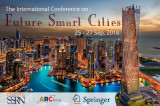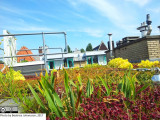Stay in the know on all smart updates of your favorite topics.
International conference: Future Smart Cities

IEREK organizes this conference in hopes of disseminating research and knowledge on the methods through which cities may be transformed into Smart cities.
It aims to improve cities through means that encompass Urban planning, Strategic Planning, Economic Planning, Architectural Development, Environmental Sustainability, Information Technology and effective use of Natural Resources.
Smart Cities are those which use Innovative methods for solving daily problems, are currently working on developing the future vision of improving the standard of living of its inhabitants
Amsterdam Tech Job Fair Autumn 2017

Tired of browsing online job boards all day long?
What if you could have all the top tech companies in Amsterdam in one place, at the same time? Amsterdam Tech Job Fair 2017 is a chance for job seekers to talk to companies that are hiring in person. If you’ve had enough of submitting your CV online without the opportunity to make a lasting first impression, here’s your chance to change your strategy and do a bit of networking.
Once again, everyone from retail, software, pharma, media, healthcare, automotive, engineering or fashion industry, startups, agencies, consultancies to high-growth tech companies are kindly invited to join to present, network, promote the brand and jobs & hire talent.
For Job Seekers
Meet recruiters from tech companies that are hiring in Amsterdam in person.
Ask all your questions and learn about what it’s actually like to work for the companies that you’re interested in.
Practice how to talk to recruiters, how to get your personality across to them and make a great first impression.
Forge new connections and grow your network of contacts.
Discover some amazing startups that are contributing to building Amsterdam’s future as a tech hub.
For Companies
Meet young graduates, interns and experienced professionals who are eager to work for tech companies. Get your job postings promoted, exhibit and present at Amsterdam Tech Job Fair 2017.
GoodCode - Coding for change

Ideas and entrepreneurship for positive impact are gaining momentum. There are a lot of ideas with great potential, but often they lack tech knowledge needed to get them off the ground.
GoodCode aims to bridge this divide by organising events that bring together people with programming skills and people keen to solve society's biggest challenges.
After the success of the first GoodCode event, we're excited to host another at Impact Hub Amsterdam. This is also part of Impact Hub's Workbench series of monthly workshops for entrepreneurs who want to take their start-up to the next level!
During the evening you can also crowdsource solutions to your most pressing question by engaging the other participants!
The program schedule is:
18:30 Walk in
19:00 Opening
19:10 First speaker: Samuel Goodwin, Developer
19:30 Second speaker: Maurits Bos, Lawyer at Benvalor
19:45 Third speaker: Laurens Slats, Global Community Manager at The Things Network
20:00 Workbench
21:00 Drinks and chatting and small informal pitches
Hope to see you there!
Amsterdam – A Data-driven City Of Europe
The smart city projects of Amsterdam overlay 8 primary categories that include big and open data, smart infrastructure, smart mobility, smart economy, smart society, smart areas, smart living and living labs.
Wanted: more assignments for Futureteams

Every organisation can come across a problem they need help with. Maybe Futureteams can assist! To prepare Business and Management students of the Amsterdam University of Applied Sciences for a future in Business they have the opportunity to work as a consulting agency, Futureteams, and solve real problems organisations might have. We are looking for organisations in the fields of: Health, Mobility, Tourism, Smart Cities or Financial Services.
Joep de Hoog has had a lot of response, but has room for a few more, you can sign in untill the 25th of September.
The students will put in effective work hours and there is no need for training or a work space. You can find more about the project on https://amsterdamsmartcity.com/projects/futureteams-can-take-on-new-assignments or here:
https://sites.google.com/enmeer.com/wervenopdrachtgevers/home (in Dutch)
Call for Smart Cities Experts: Research on evaluation-prioritization of smart cities projects
The aim of our research is to record experts' opinion about the importance of each action/project that has been collected and categorised.
Please evaluate the importance of each action regarding its possible contribution to making a city smarter (or more sustainable, consuming fewer resources, with the use of ICT). You may also recommend actions, filling in the appropriate space (other actions) in each category. Please consider that you are giving your expert opinion for a medium-sized city, in a rather early-stage of ICT development.
We would be grateful if you could contribute with some of your knowledge to our research.
Link for the questionnaire for smart cities experts: https://t.co/UfJEnaVOL1
Thank you in advance for your time and help,
Nikolaos Vogiatzis (icsdm15021@aegean.gr)
Dimitrios Kolokotronis (icsdm15028@aegean.gr)
Sustainable Storytelling with Team Solar Flora

The role of the storyteller is to translate information into something that humans react to on an personal level. To develop narratives that engage us deeply to help us better understand the world.
For this summer academy project, the team Solar Flora search for an ongoing projects at Amsterdam Smart City platform and found the Rooftop Revolution then we decided to go for the topic Rooftop gardens. We contacted an enthusiast in Amsterdam and created the story.
MensenWerk: Planning for the Future of Urban Living
The work landscape is changing rapidly. The future workplace is becoming less predictable with flexibility, democratization and robotization as key words of the ongoing change. How can spatial planning follow and adapt to these rapid economic and technological changes remains a critical question. SPCitI most recent research project looks exactly at that.
Wanted: real assignments for student consulting agency
To prepare Business and Management students of the Amsterdam University of Applied Sciences for a future in Business they have the opportunity to work as a consulting agency, Futureteams, and solve real problems organisations might have. We are looking for organisations in the fields of: Health, Mobility, Tourism, Smart Cities or Financial Services.
If you have an organizational problem, Futureteams can help! They will put in effective work hours and need no training or work space. You can find further information about the project https://amsterdamsmartcity.com/projects/futureteams-can-take-on-new-assignments or here:
https://sites.google.com/enmeer.com/wervenopdrachtgevers/home (in Dutch)
Can start-ups help to make the city more attractive?
Can start-ups help to make the city more attractive? Luis Carvalho and Willem van Winden (Amsterdam University of Applied Sciences) draw lessons from Amsterdam’s “Start-up in Residence” programme.
Amsterdam is exploring ways to engage start-up companies in the development of new solutions for urban problems and challenges, ranging from reducing bicycle theft, separating waste streams more effectively, or promoting alternative tourism. We analyse this new practice and its impact, by interviewing opinions and experiences of startups, city departments involved, and experts.
We derive recommendations for improvement and practical guidelines for other cities that may want to start a similar programme.
The results will be elaborated in a paper, to be presented at the prestigious RENT conference in Lund, Sweden. http://www.rent-research.org/rent-xxxi
Master Thesis - Governance Focus
Hi everyone! I am current Business Master student. I am doing my master thesis focusing the ASC as a case study. My main interest is to understand how the ASC is structured in the governance field and how the municipality is involved to create this innovative environment. The thesis is part of an University of Sao Paulo research group. @Esther Somers could you help me to get in contact with someone that would contribute to improve this research development
Smart City Dialogue: The role of big companies in the Smart City

Companies shape the cities we live in. Especially larger companies have the capacity to invest, the ability to scale up new technology and a strong interests in getting involved in public private partnerships. For them, smart cities are increasingly becoming an attractive growth market. For governments these larger companies are attractive partners. Indeed, companies are involved in a lot of smart city projects in Amsterdam.
Companies play their role in smart cities in ways that may be described as ‘politics with different means’. They develop algorithms that define how citizens are nudged towards particular kinds of behavior. They try to set standards for the future. They are given access to data that they may also use for investment decisions. They provide services that may render public services obsolete.
Our next smart city dialogue is about these roles played by companies in public-private partnerships and the relation between these partnerships and representative democracy. Do public-private partnerships indeed bypass democratic politics under the label of smartness and innovation. If so, how can elected politicians control and hold companies accountable? Or are representative democracy and public private partnerships complementary modes of governance that each act on their own kinds of challenges?
Speakers:
Willem van Winden, Daniel van der Buusse, Roel Nahuis and Wieke Schrama
Interesting for anyone working within but also with these bigger companies in Amsterdam smart city! Join the smart dialogue on the 12th of sept at the Amsterdam University of Applied Science from 3 – 5 PM. Wibaustraat 3b, room 05A26.
Please register by emailing to smartcityacademy@hva.nl
(MBA) Thesis research topics on smart cities
Hello everyone:
I've been researching in smart cities topic and I'm really interested in making a contribution in this field, especially on the managerial side.
but I still can't connect it directly to my thesis since it should concern business topics, I'm focusing on management/innovation/leadership
I would appreciate some suggestions about research questions concerning this topic.
tags: smart cities- MBA- leadership- business- thesis-organizations-management-innovation.
Watch now the Webinar EIP-SCC on "organising smart city projects"
This webinar gives some insights into the research on 12 Amsterdam Smart City projects, conducted by the Amsterdam University of Applied Science together with Amsterdam Smart City.
From minute 9.37 onwards, professor van Winden presents the wide context of smart projects, focusing on non-technological aspects of smart city projects. He addresses several challenges commonly faced during smart projects; for example, the collaboration of organisations with different agendas and the involvement of different stakeholders and how to divide returns and risks. From minute 40 onwards professor van Winden answers some questions coming from the audience who attended the webinar live at the 6th of june.
Organising Smart City Projects: Lessons learned from Amsterdam
The last two years, our partner the University of Applied Sciences systematically analysed 12 smart city projects in Amsterdam. In close cooperation with Amsterdam Smart City five researchers started a thorough evaluation of projects to draw lessons and make future smart city projects more effective.
The idea was to analyse the non-technological aspects of smart city projects
(partnerships, business models, scaling potential) since smart city solutions are not just about developing and applying technology. It demands new networking and management competencies. Solutions are not developed and implemented by one single company, but take shape in networks and with the involvement of citizens/end users. Partnerships are formed, they all work differently and face different challenges. In this study, a number of smart city projects in Amsterdam is analysed in their wider context.
This final report is now out and focuses on questions as:
- How do organisations with different agendas, collaborate on smart city projects?
- What challenges do they face?
- What kind of value is created?
- How are risks and returns shared, and how are users involved?
- What is the upscaling dynamic of smart city solutions, if any?
- How can smart city projects be managed professionally?
You can open the report below. This report is issued by the Amsterdam University of Applied Sciences and has been established in cooperation with Amsterdam Smart City.
On the 19th of December 2017 the insights of the report were shared at Pakhuis de Zwijger: https://amsterdamsmartcity.com/events/lessen-uit-een-slim-amsterdam
Are you interested in doing research together or do you have a smart city question? Get in touch via https://amsterdamsmartcity.com/projects/smart-entrepreneurial-lab.
Summary of the report here: https://drive.google.com/file/d/1ZexHe85DpGmpHjlPa9kam-TYUsUIR8Jp/view?usp=sharing
Smart city pilots: scaling up or fading out?
We studied 12 smart city projects in Amsterdam, and –among other things- analysed their upscaling potential and dynamics. Here are some of our findings:
First, upscaling comes in various forms: rollout, expansion and replication. In roll-out, a technology or solution that was successfully tested and developed in the pilot project is commercialised/brought to the market (market roll-out), widely applied in an organisation (organisational roll-out), or rolled out across the city (city roll-out). Possibilities for rollout largely emerge from living-lab projects (such as Climate street and WeGo), where companies can test beta versions of new products/solutions. Expansion is the second type of upscaling. Here, the smart city pilot project is expanded by a) adding partners, b) extending the geographical area covered by the solution, or c) adding functionality. This type of upscaling applies to platform projects, for example smart cards for tourists, where the value of the solution grows with the number of participating organisations. Replication is the third and most problematic type of upscaling. Here, the solution that was developed in the pilot project is replicated elsewhere (another organisation, another part of the city, or another city). Replication can be done by the original pilot partnership but also by others, and the replication can be exact or by proxy. We found that the replication potential of projects is often limited because the project’s success is highly context-sensitive. Replication can also be complex because new contexts might often require the establishment of new partnerships. Possibilities for replication exist, though, at the level of working methods, specific technologies or tools, but variations among contexts should be taken into consideration.
Second, upscaling should be considered from the start of the pilot project and not solely at the end. Ask the following questions: What kind of upscaling is envisioned? What parts of the project will have potential for upscaling, and what partners do we need to scale up the project as desired?
Third, the scale-up stage is quite different from the pilot stage: it requires different people, competencies, organisational setups and funding mechanisms. Thus, pilot project must be well connected to the parent organisations, else it becomes a “sandbox” that will stay a sandbox.
Finally, “scaling” is not a holy grail. There is nothing wrong when pilot projects fail, as long as
the lessons are lessons learned for new projects, and shared with others. Cities should do more to facilitate learning between their smart city projects, to learn and innovate faster.
(With a team of five researchers of the Amsterdam University of Applied Sciences (AUAS/HvA) we systematically analysed several smart city projects in Amsterdam. This post includes one of the key insights into the management of smart city projects. The report with all our findings will be published next week on the online platform Amsterdam Smart City).
Stay up to date
Get notified about new updates, opportunities or events that match your interests.


